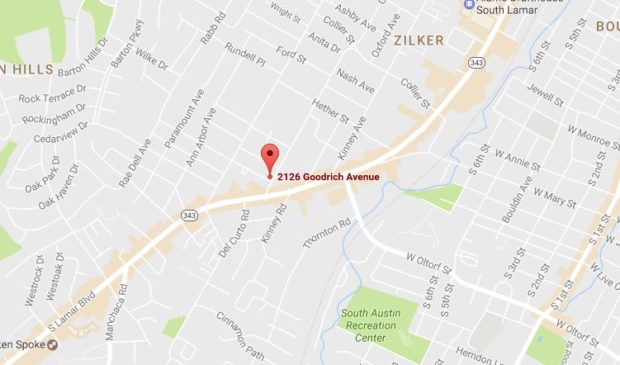Tax credits could provide big increase in affordable housing units on Goodrich Ave.
Monday, February 13, 2017 by
Jack Craver With the assistance of the state and federal government, Pathways at Goodrich Place, a public housing complex at 2126 Goodrich Ave., may soon have more than three times as many apartment units serving residents who otherwise couldn’t afford to live in the surrounding Zilker neighborhood.
City Council voted Thursday to endorse an application by Pathways at Goodrich LP, a partnership between the Housing Authority of the City of Austin and private investors, for state tax credits to help it finance the redevelopment and expansion of the property. Its plan is to increase the number of units from its current 40 to as high as 140.
The Goodrich property is the 10th housing complex that Pathways is redeveloping as part of the federal Rental Assistance Demonstration program that Congress authorized in 2012 as a way for public housing agencies to seek private funding to make up for the persistent lack of federal support. The Goodrich property is the first such project in Austin, however, that will involve adding a significant number of units.
“Before, the chief investor in our properties was the federal government,” explained HACA President Michael Gerber in an interview with the Austin Monitor.
“The reason we’re doing RAD,” he added, “is because they haven’t kept up with their part of the bargain to help provide the resources to keep these properties maintained. So what they’ve said is, ‘You can take us out as your principal partner in return for bringing in a qualified investor who will allow you all to make dramatic improvements to your existing public housing stock and to add additional units to meet your affordability needs.’”
In addition to Gerber, several activists attended the Council meeting to support the project, all of them describing it as a golden opportunity to provide low-income housing in Central Austin.
“Let’s keep our low-income families downtown,” said Ruby Roa, a longtime advocate for the poor on energy and housing issues.
David King, president of the Austin Neighborhoods Council and a Zilker resident himself, applauded the addition of subsidized housing for low-income tenants but said he was concerned about the potential inclusion of a small number of market-rate units in the project. He worried that they would take up space that otherwise could be reserved for low-income tenants. He also suggested it would “set a precedent” for similar projects.
Gerber responded that there would be no market-rate units; the most expensive units will be reserved for those at 80 percent MFI.
Although the property’s chief constituency are those in the lowest income levels, the intent of having units for those at higher income levels is to allow tenants to stay even if their incomes increase after moving in, Gerber said. Those at 80 percent MFI would be very unlikely to find an apartment they could afford elsewhere in the surrounding area, he later told the Monitor.
Gerber added that while his organization had backed away from plans to include market-rate units in a neighborhood where building is “sensitive,” the notion of excluding market-rate tenants from affordable housing developments was “misguided.”
“We do support mixed-income properties,” he said.
Council Member Pio Renteria agreed that very strict income restrictions could lead to people having to leave their neighborhoods, saying that he knew of people who had quit or avoided better-paying jobs so that they could stay in their apartments.
In order to qualify for the tax credits, the housing complex has to provide a certain number of amenities as well as services to its tenants. Potential services include on-site job training or GED preparation, transit vouchers, addiction counseling, financial counseling or exercise courses.
If the project does not qualify for the state tax credits, said Gerber, Pathways will find alternative funding sources.
Winning the official support of various political entities is part of the complicated application process that projects go through to receive the 9 percent state low-income housing tax credits. Council’s endorsement added a certain number of points to Pathways’ application, making it more likely to succeed.
State Rep. Celia Israel’s decision not to endorse the Elysium Park affordable housing project in her district last year sparked controversy; the project, which was authorized by Council last week, is going forward nevertheless, and developers remain hopeful that this year it will win Israel’s support as well.
The Austin Monitor’s work is made possible by donations from the community. Though our reporting covers donors from time to time, we are careful to keep business and editorial efforts separate while maintaining transparency. A complete list of donors is available here, and our code of ethics is explained here.
You're a community leader
And we’re honored you look to us for serious, in-depth news. You know a strong community needs local and dedicated watchdog reporting. We’re here for you and that won’t change. Now will you take the powerful next step and support our nonprofit news organization?



